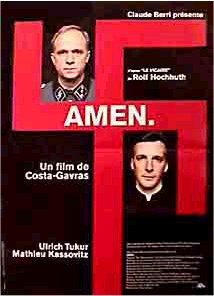Amen.
| Amen. | |
|---|---|
 Theatrical release poster | |
| Directed by | Costa-Gavras |
| Written by | |
| Produced by | Claude Berri |
| Starring | |
| Cinematography | Patrick Blossier |
| Edited by | Yannick Kergoat |
| Music by | Armand Amar |
| Distributed by |
|
Release date | 2002 |
Running time | 132 minutes |
| Countries |
|
| Language | English |
| Budget | € 15,700,000 |
| Box office | € 11,217,610 (France) |
Amen. is a 2002 historical drama film co-written and directed by Costa-Gavras and starring Ulrich Tukur, Mathieu Kassovitz, Sebastian Koch and Ulrich Mühe. The film examines the political and diplomatic relationship between the Vatican and Nazi Germany during World War II. It is based upon the play Der Stellvertreter by Rolf Hochhuth.
Plot[]
During World War II, Kurt Gerstein (Ulrich Tukur), a Waffen-SS officer employed in the SS Hygiene Institute, designs programs for the purification of water and the destruction of vermin. He is shocked to learn that the process he has developed to eradicate typhus, by using a hydrogen cyanide mixture called Zyklon B, is now being used for killing Jews and other "undesirables" in extermination camps. Gerstein attempts to notify Pope Pius XII (Marcel Iureş) about the gassings, but is appalled by the lack of response he gets from the Catholic hierarchy. The only person moved is Riccardo Fontana (Mathieu Kassovitz), a young Jesuit priest. Fontana and Gerstein attempt to raise awareness about what is happening to the Jews in Europe but even after Fontana appealing to the pope himself, the Vatican makes only a timid and vague condemnation of Hitler and Nazi Germany.
Eventually Gerstein travels to Rome to speak to the Pope himself but is not allowed. When he arrives the Germans are taking control of Rome and begin rounding up the Italian Jews to be sent to the death camps. Fontana begs the Pope to force the Germans to stop the deportation by appearing at the train station in person but the Pope refuses, saying that doing so will cause hardship for the Christians living under Nazi Germany. In disgust and sorrow Fontana puts the Jewish Star-of- David yellow badge on himself and presents himself to be taken on the train of Jews being deported to the death camps. When he arrives at the camp Fontana is interrogated by the head of the camp, a powerful 'friend' of Kurt Gerstein known simply as the Doctor, who despite knowing that the war is lost and that Fontana is a Catholic priest, allows Fontana to stay with the Jews and work in the crematorium, and eventually orders him gassed.
Gerstein attempts to save Fontana but he will not leave. The Doctor escorts Gerstein out of the camp as Fontana and the remaining Jews continue to be murdered. They drive by German soldiers digging up and burning the bodies of previously murdered Jews in a mass grave near the camp, and the Doctor asks Gerstein if he knows any contacts to help get him out of Germany. Gerstein returns home and gathers all his evidence that documents the Nazi atrocities and takes them to the Allies. Despite accepting his evidence he is still arrested and after reading the charges against him he is found hanged in his cell. Afterward the Doctor is seen speaking to a Cardinal in Rome asking for help leaving the country saying "I'm a doctor, just a physician" and the cardinal agrees to help send him to Argentina.
While the character of Kurt Gerstein is historical, the character of the young priest is fictional. Although based on the actions of Gerstein to hinder and bring global attention to the Holocaust, the plot is largely fictitious.
Cast[]
- Ulrich Mühe as The Doctor
- Sebastian Koch as Rudolf Höss
- Ulrich Tukur as Kurt Gerstein
- Mathieu Kassovitz as Riccardo Fontana
- Marcel Iureş as Pope Pius XII
- Michel Duchaussoy as Cardinal
- Ion Caramitru as Graaf Fontana
- Friedrich von Thun as Gerstein's Father
- Antje Schmidt as Mrs. Gerstein
- Hanns Zischler as Ernst-Robert Grawitz
- Erich Hallhuber as Von Rutta
- Angus MacInnes as Tittman
- as Bishop von Galen
- Pierre Franckh as Pastor Wehr
Production[]
The film is based on a 1963 play by Rolf Hochhuth, The Deputy, a Christian Tragedy, which was widely attacked in Catholic and Jewish circles for its portrayal of Pope Pius XII. The German-language version of the film was released under the play's original title Der Stellvertreter.[1]
Since the Holy See did not allow filming in the Vatican, the scenes in the papal palaces were shot in the Palace of the Parliament of Bucharest, Romania.[2]
See also[]
References[]
- ^ "Amen (Movie, 2002) Review | STATIC MASS EMPORIUM".
- ^ "Filming in Romania". 11 December 2013.
External links[]
- Amen. at IMDb
- Amen. at Rotten Tomatoes
- Amen. at Box Office Mojo
- trailer and links to US reviews at Metacritic
- Review at Reeling Reviews
- English-language films
- 2002 films
- 2000s war drama films
- English-language French films
- English-language German films
- Films critical of the Catholic Church
- Films about popes
- Films directed by Costa Gavras
- Films set in Germany
- Films set in Poland
- Films set in Vatican City
- French films
- Films set in Rome
- German films
- World War II films
- Holocaust films
- Romanian films
- Romanian war drama films
- French war drama films
- Films shot in Bucharest
- Best Film Lumières Award winners
- Cultural depictions of Pope Pius XII
- German war drama films
- Romanian drama films
- 2002 drama films